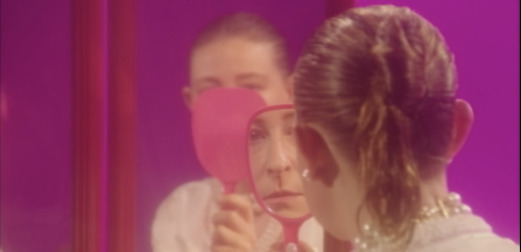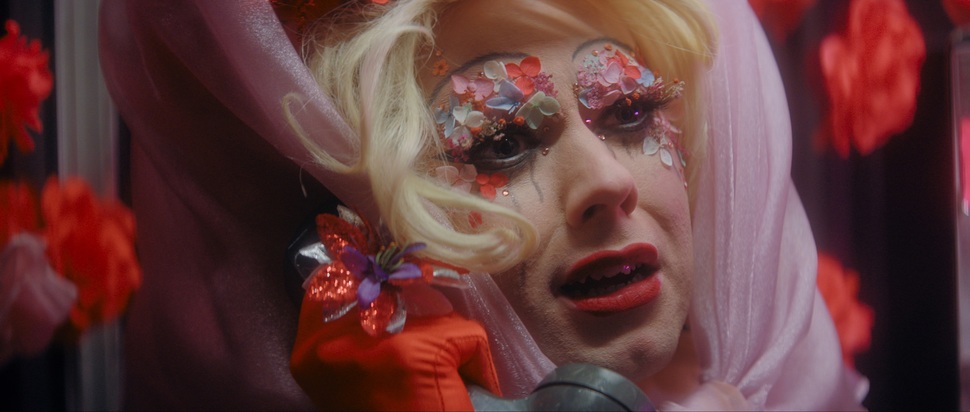EIFF 2022: Amanda Kramer interview
Amanda Kramer brings not one but two jaw-dropping films to EIFF this year, Please Baby Please and Give Me Pity! She talks to us about embracing theatricality, bringing an art school cool back to cinema and the iconic awesomeness of Terminator 2
When we sit down with American musician and filmmaker Amanda Kramer, she’s preparing for an LA screening of Please Baby Please – one of two films of hers (alongside Give Me Pity!) showing at the 2022 Edinburgh International Film Festival. The former sees a respectable bohemian couple’s identities upended (or liberated?) by flamboyant gangsters. In the latter, a star’s TV special is threatened by sinister forces. The spectre of Americana looms over the stylings of Please Baby Please and the jaw-dropping rendition of You're a Grand Old Flag near the beginning of Give Me Pity!
“It’s a bit mean-spirited,” Kramer admits of this montage. “I have a strange anti-nationalist flair. I am a pastiche filmmaker. I want what I make to be a love letter between the films and filmmakers that inspire me and in the current conversation of contemporary cinema.” Give Me Pity! further draws on music videos and diva-dom. “Almost all female pop stars have moments of incorporating America into their act. You'll see an American flag bikini music video or fireworks shooting out of a bra. I cannot tell you how turned off I am. But I have to go through it because I have to understand it.”
Please Baby Please is rooted in the dark heart of 1950s cinema. “I find [1950s American films] incredibly claustrophobic and bizarre,” she says. “There was this idea that we had come home from the war, we were happy, our men were back, we were creating babies – we were in the best time, right? But those films are depressing, bizarre and perverse – very unhappy and ill at ease. They have secret histories inside of them. Many people see the 1950s as this idyllic time, and 1950s men and women as models of white heteronormative values. I want to have a conversation with that and destroy that.”
This goes much further than worrying about elements of 1950s cinema that haven’t aged well. “It’s obvious to say, ‘that's sexist, that’s racist,’ but that's a very easy relationship,” Kramer elaborates. “I'm talking about a deeper and more entrenched depression, sadness, and loneliness from seeing that war, even when you come out triumphant. There was something lost in the American spirit. Men are drinking and sad and smoking and yearning and lonely and cannot ever find satisfaction.” This melancholy of man still echoes today. “Normally as a feminist I would say ‘who cares?’,” she says with a laugh. “But I like watching those movies and thinking about how that codified a way of thinking throughout the century, a reason why [men] feel they deserve ownership over the world.”

Give Me Pity!
Kramer considers herself a writer first, but Please Baby Please and Give Me Pity! are kaleidoscopic, vibrant experiences – surreal nightmares you don’t want to leave. She credits those around her with the realisation of her vision. “You have to have good taste,” she says of filmmaking. “With great taste, you can create amazing things when nothing exists before you. I want to be in someone's memory.” She cites two of her favourite figures – Freddy Krueger and the Terminator – as examples of icons. “They will never leave the imagination. Why is that? Those films don’t mean anything. They have themes we could talk about, but that’s not it. T2 is flawless. That’s a commercial Hollywood movie, so that makes me feel like everyone’s not doing a good job now! I don't think coolness is in filmmaking anymore. A lot of the cool people have left and are doing something else.”
Kramer's films don't exist in the realms of realism. Theatricality on screen is very much a positive, she reckons. “There's no such thing as over the top,” says Kramer. “People don't pay for under the top! When I have the opportunity to guide an actor, I don't think there's too much theatricality. Style is substance. It's as hard to have style as it is to have substance. I hire people with incredible fine arts tastes to help my vision.”
In Give Me Pity!, Sophie von Haselberg plays Sissy St. Claire, the young performer whose TV special goes awry. Before the film's shoot, Haselberg would rehearse relentlessly, with Kramer running out of notes to give. “Every day I would feel so exhausted on her behalf. She’d be in hair and makeup for hours and then she's singing, doing monologues, dancing. She's a consummate performer. It reminds me of the specials where Cher is in eight wigs and running across the stage with costume changes and balloons coming out everywhere.”
Surely not all TV specials are as haunted as Sissy St. Claire’s? “No, they all are. I promise. It's a deranged format,” insists Kramer, citing the “subterranean rumble” to Lady Gaga’s Thanksgiving special and the “incredibly eerie” Carpenters specials. “I watched hundreds of hours of specials before we made Give Me Pity! Everything I would see I would think, ‘this is so strange, am I the only one seeing this?’ Sometimes it feels like you're picking up on a current or station but only for you.”
The performances in Please Baby Please are similarly heightened and inspired. It's electrified by Andrea Riseborough’s Suze and Harry Melling’s Arthur. “I exist, I think, in a large part, to write great parts for women of all ages,” Kramer says. “Actresses deserve to have as complex, bizarre, and difficult parts as their male co-stars. When you write for Andrea, you know her capacity and understand the lengths she will go to and the level she can reach. You should be unafraid because she will be unafraid. When you have those experiences with actresses, you're inspired to turn the volume up on those characters. There's a myth that there’s a lot of vanity in Hollywood and acting. There are women who truly want to eschew that and be a disgusting version of a character. I'm the filmmaker to bring that out. I'm lucky they exist and I hope they feel lucky that I exist too.”
And of Riseborough's co-star? “Harry is one of the best,” she says. “He's a very tender and thoughtful actor. The character of Arthur is more irritating on the page because he's frustrated, closeted, but also uncommunicative. Harry wanted it to be a love story. He wanted him and Andrea to be sweethearts, as well as him and Karl [Glusman, who plays Teddy, the pretty boy gangster who both halves of the coupe fall for], so he had to have chemistry with both. I'm very lucky that he gave the performance he did. He is the tender heart of the film.
“When I cast someone, I'm upfront with them,” Kramer adds. “I am not interested in 'good acting'. I need someone to build a character that feels iconic and singular.”
Kramer’s ethos seems at odds with current blockbusters, but she doesn’t feel alone. “Everyone sees a Marvel movie and thinks ‘what are we doing?’,” she says. “We’re making money. The people who are working really hard to infuse art back into [film] are the heroes of the industry.” To her, trying something new is paramount. “I used to think it was trite to say I'm amusing myself, but I don't feel that way anymore. I take filmmaking seriously but I don't make serious work. I allow myself the opportunity to be surreal and experimental. Imagine wasting brain space hoping to get an Oscar.”
While it’s been a big festival year for Kramer, she remains focused on what she calls her “true love”: writing. Hot on the heels of Please Baby Please and Give Me Pity!, she has two films in the pipeline. Both sound unmissable: “a 70s thriller and a really fucked-up feminist action film. I hope I can do T2 justice! My god! I don’t want to let T2 down!”
Please Baby Please: Everyman, 18 Aug, 8pm; Filmhouse, 19 Aug, 4.45pm
Give Me Pity!: Filmhouse, 15 Aug, 9.30pm; 19 Aug, 2.30pm
